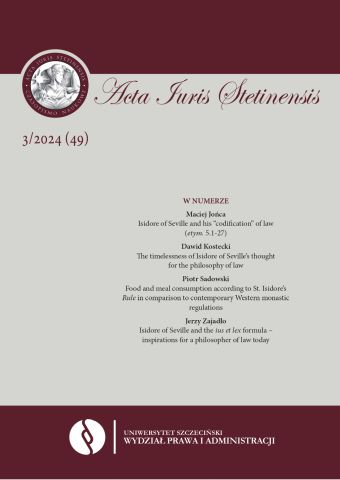
We kindly inform you that, as long as the subject affiliation of our 300.000+ articles is in progress, you might get unsufficient or no results on your third level or second level search. In this case, please broaden your search criteria.

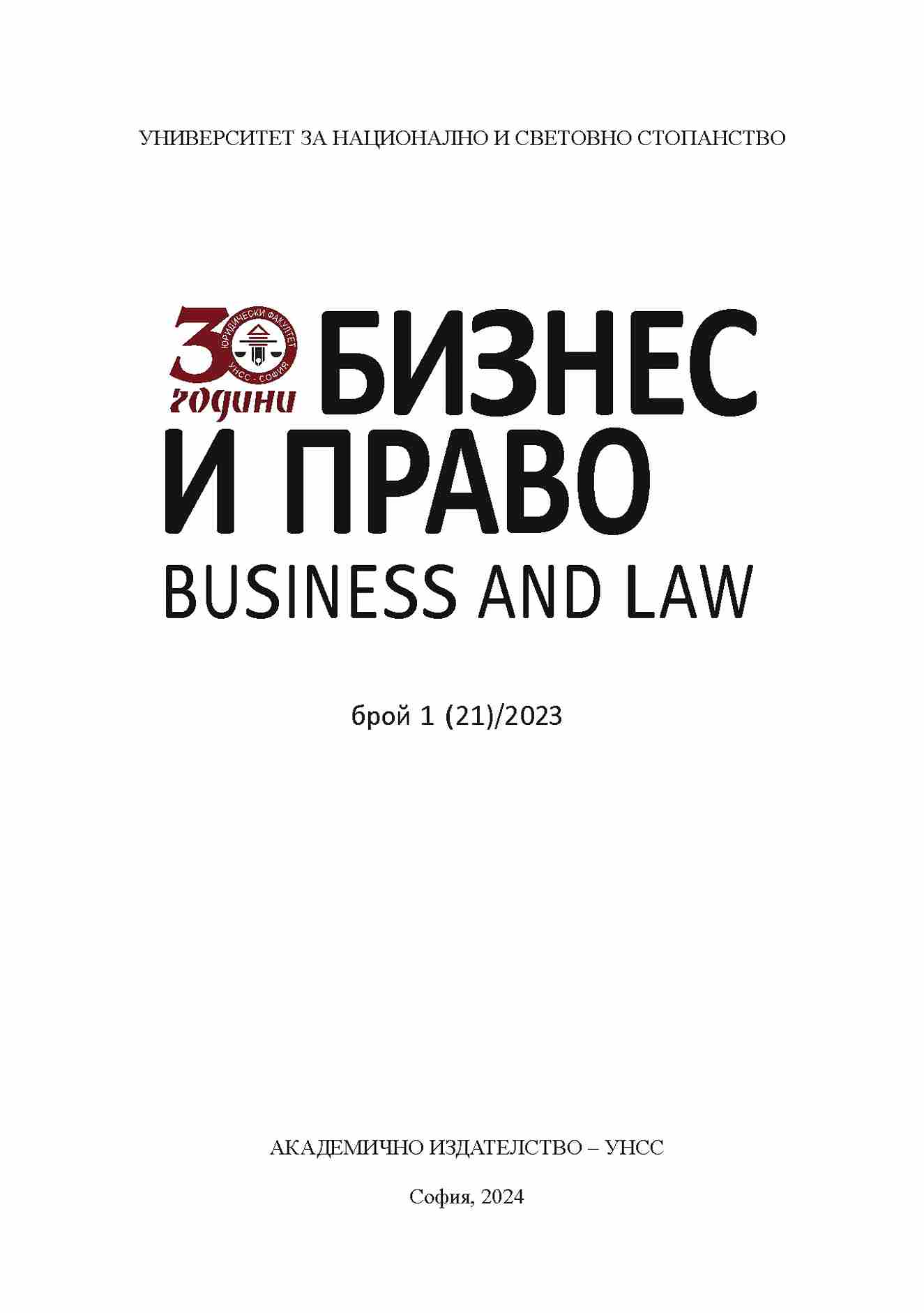
The present article examines the problems faced by the fire safety and civil protection authorities in the Republic of Bulgaria in exercising control over compliance with fire safety rules and regulations in buildings under condominium ownership, specifically in residential buildings. Special attention is paid to the status of the subjects inhabiting residential buildings in the context of their interactions with the authorities of the General Directorate Fire Safety and Civil Protection. Conclusions and corresponding recommendations for the necessary legislative changes, according to the author, are drawn.
More...
One of the special conditions that in retrospect proved to be decisive for the formation of Western industrial society is the emergence of the unique occidental urban culture. The guilds as "communes pré-légales" formed the nucleus for this. Without them, the social type of the free and equal citizen, who is loyal to his community, is inconceivable. As "groupements pré-urbains", they brought the forms and spirit of fraternity by oath to the emerging cities. As "initiatrices de l'autonomie urbaine" they secured political and commercial self-government in the city and territory vis-à-vis the authorities. In the view of Max Weber, the uniqueness of the occidental city is correspondingly linked to the associational character that occurred there, and also Otto Hintze pointed out that the European development into a free community was a singular phenomenon that had not occurred in this form anywhere else. Although there were guilds and similar associations of persons in the East, for example in China, the decisive difference to the European groups lay in the fact that the former remained connected to the idea of family, clan and tribal. While the dynastic rule regularly established a vertically structured organization, the "artificial kinship" resulted in a horizontal formation, which was established as a free "union" between the participants by contract and oath was characterized by certain principles. The constitutive feature was the oath that was linked to the treaty and indissolubly bound the "confederates" („Eidgenossen“) to each other. In examining the organizing principles of these "unifications", four areas must be emphasized: 1. The unconditional obligation to assist each other ("against all and everyone"). 2. The professional, social and (or) pastoral support of its members. 3. The primacy of one's own legal system. 4. The order of the Community by law and procedure. The Swiss "Eid-Genossenschaft" of 1291, which, apart from the free imperial cities of the Holy Roman Empire, was the only horizontal association to assert itself at the state level, and still proudly bears this designation today, is a prominent example of the constitutive and at the same time hardened by the oath an association of this form.
More...
The article shows that the perception of the law depends on the point of view of the one who works with it. Three perspectives are particularly important: those of the scholar, the judge, and the politician. Each of the professions that has law as its object foregrounds specific requirements, the fulfillment of which determines the quality of the respective activity The topic has already been partially and more generally raised and addressed in two foundational lectures by Max Weber: Politics as a Vocation and Science as a Vocation, but specifically for law and in the chosen triple relation it contains novelty. What is new is the 'three-dimensional' delineation of the roles into which the lawyer can enter as scientist, judge or politician. The views of law and the operation of law dictated by each of these roles require distinctions and parallels to be drawn between them. Such parallels are consistently drawn between the way law is viewed and used by scholar and judge, scholar and politician, and judge and politician. The comparative analysis shows both the commonalities and the differences in the treatment of law by each. Points of congruence are found even where they seem least, between the judge and the politician, and differences are found even between the modus operandi of the legal scholar and the judge, activities that are inherently compatible.
More...
The purpose of this study is to identify the legal problems related to the obligation to report on sustainable development, which arise from the norms contained in European Union acts, juxtaposed with the restriction of the right to information on the environment and its protection under national legislation. The content of the reporting obligation is discussed, the entities subject to it are indicated and the general principles of reporting under the CSRD are summarised. Subsequently, the right to information on the environment and its protection was analysed in terms of subject and object scope, referring to the Constitution of the Republic of Poland, as well as to the Act on the provision of information on the environment and its protection, public participation in environmental protection and environmental impact assessments. In this context, the question of the impact of the limitation of the right to information on the environment and its protection on the implementation of the sustainability reporting obligation was answered.
More...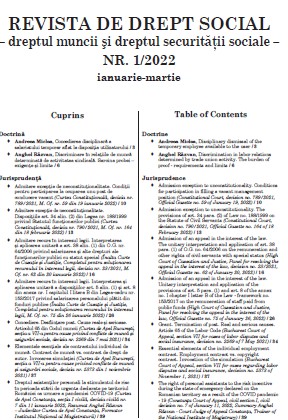
Înalta Curte de Casație și Justiție, Completul pentru dezlegarea unor chestiuni de drept, decizia nr. 61/2022, M. Of. nr. 1.172 din 7 decembrie 2022
More...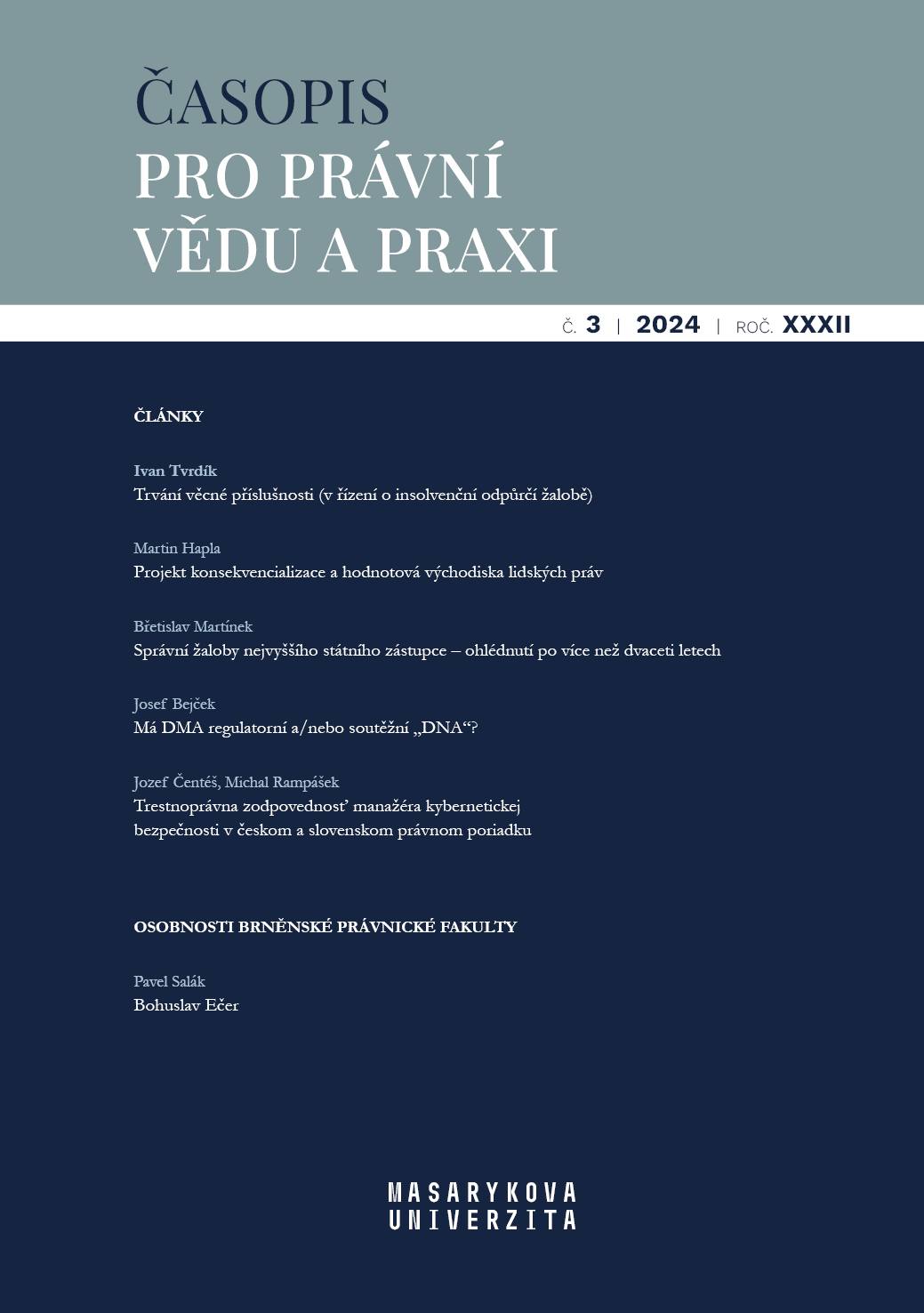
The paper deals with the application practice of the Prosecutor General in the area of his special standing under Section 66(2) of the Administrative Procedure Code and related case law of administrative courts. The analysis presents an overall view of individual cases and their comprehensive summary. Among other things, it subsequently shows that, with the exception of the area of construction and environmental law, there are significant differences in both the number and the areas of actions brought to protect the public interest from year to year. The results of the research show that the vast majority of these actions are aimed at quashing potentially illegal decisions in the areas of traffic offences, nostrification of foreign titles and photovoltaic plant licensing – very narrow areas of administrative law in which the Prosecutor General has intervened to overturn illegal decisions issued in a large number of similar cases. The assessment of the merits of these actions has undergone a significant development over the period of the existence of this provision of the Administrative Procedure Code, caused not by a change in the statutory regulation, but by the case law of the administrative courts and subsequently the Constitutional Court. The author of the article criticizes these conclusions. However, the forthcoming amendment to the Administrative Procedure Code envisages a variant of the amendment to the said provision, which would probably overcome the referred non-conceptual effects of this case law and would allow the courts to review the active legal standing of the Prosecutor General more widely.
More...
In the article, based on the analysis of the approaches of legal science to revealing the content of the concept of legal regime, its essence is substantiated as a set of legal norms that determine the order of regulation of a certain range of social relations. The types, main characteristics and differences of legal regimes of martial law, state of emergency, zone of an ecological emergency zone and zone of temporarily occupied territory are disclosed. Key words: legal regime, types of legal regimes, the legal regime of martial law, the legal regime of a state of emergency, the legal regime of an ecological emergency zone, the legal regime of a temporarily occupied territory
More...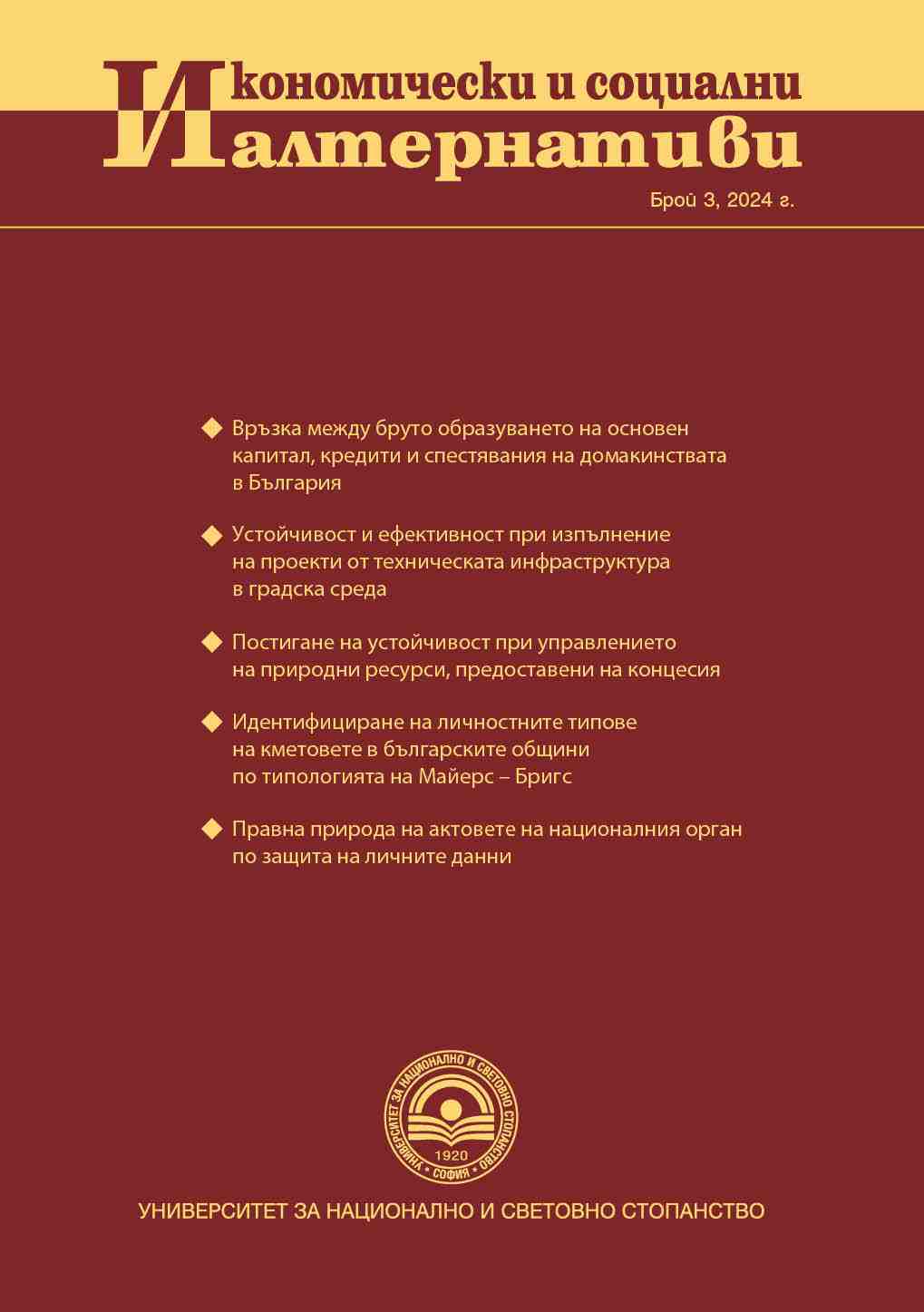
The national supervisory authority for data protection is the Commission for Personal Data Protection, which, as of 2023, is also the central authority for external whistleblowing and for the protection of persons reporting violations of Bulgarian legislation or acts of the European Union that threaten or harm the public interest. Based on its competencies, it issues administrative acts that hold an important place in Bulgaria’s legal system. This study will examine and analyze the legal acts of the commission, which it issues as a specialized body carrying out supervisory activities to prevent the violation of individuals’ rights and ensure their adequate protection.
More...
The article discusses the shortcomings of the current Criminal Code, which can lead to innocent people being accused of crimes. In the article, examples of outdated provisions, unclear provisions, and criminal provisions that could be more successfully sanctioned through administrative legal means are examined. The author concludes that these deficiencies in the current criminal justice system can be addressed by adopting a new Criminal Code.
More...
The article discusses the question of the methods of proof, as an important institute of the criminal procedure. On the basis of research about scientific studies and court judgments are discovered their main characteristics, as the only tool of the collection of evidence. On this ground, conclusions were drawn about the cognitive and documenting nature of the methods of proof, their general purpose, and legal nature. All this served as a reason for the presentation of a scientific definition and some recommendations.
More...
This article presents a view on the administrative prejudices in the Criminal Code from the point of multiple offences. The author attempts to define the “peculiar” multiple offences and to outline their most important characteristics. This article dwells on the general regularities and prerequisites for the “peculiar” multiple offences.
More...
This article examines the initiation, course, and conclusion of the procedure for institutional accreditation with an administrative act adopted by the Accreditation Council of the National Evaluation and Accreditation Agency. The research is focused on uncovering procedural challenges and identifying potential ways to overcome them.
More...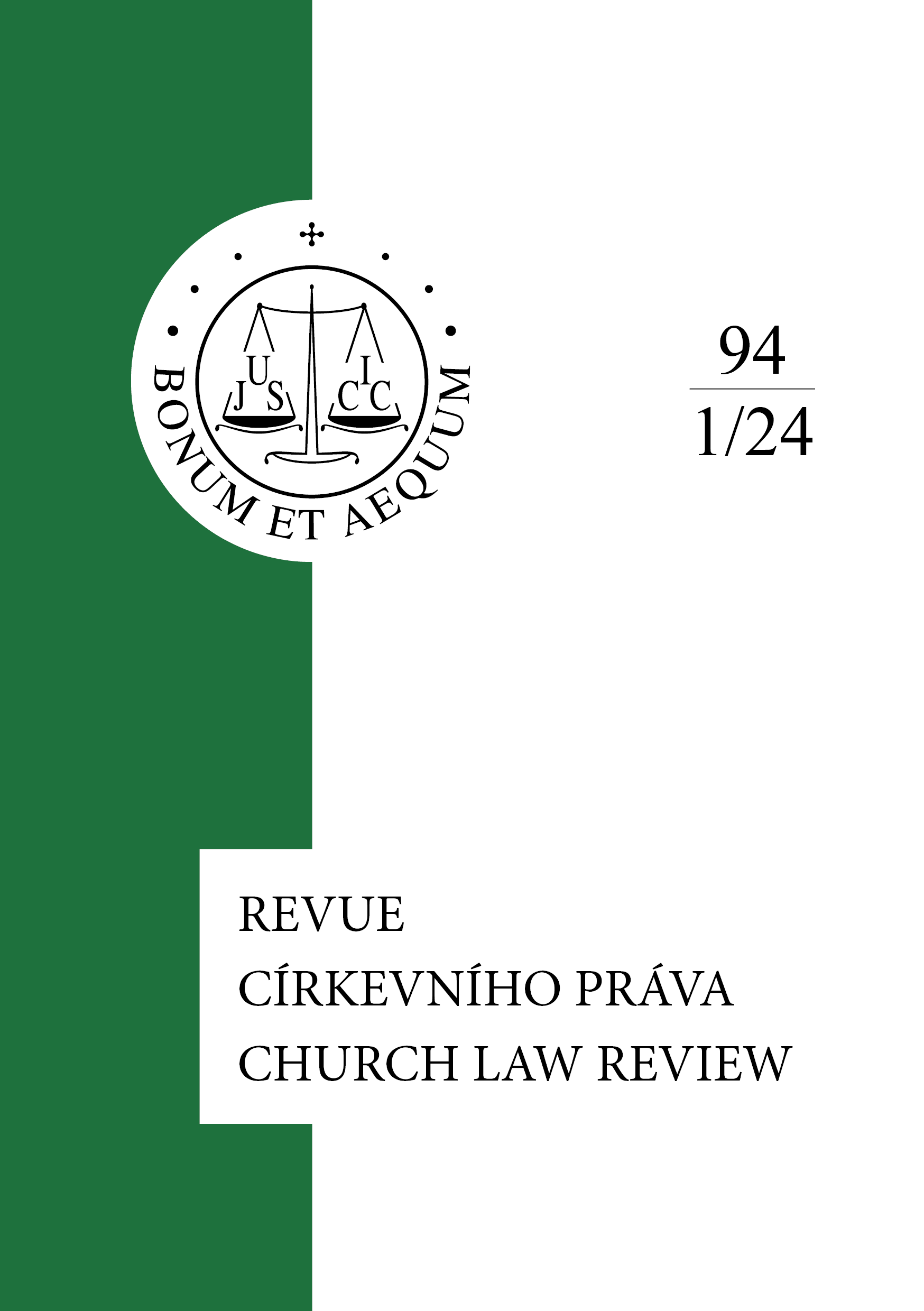
The article describes the possibility of establishing ecclesiastical administrative courts at the level of local churches, especially episcopal conferences, with a focus on the situation in the Czech Republic. The content of the text is limited to the Code of the Latin Church. The article first introduces the project of local administrative courts in the preparatory work for the CIC/1983, which envisaged a parallel choice between hierarchical recourse and administrative action before an administrative court. The Latin Code was then promulgated without norms governing administrative justice. In CIC/1983, only two provisions are devoted to administrative courts, namely can. 149 § 2 and 1400 § 2. Next, the text briefly introduces the administrative hierarchical recourse under cann. 1732–1739 CIC and presents three ways in which local administrative courts could be established. Finally, the article presents some practical objections to the establishment of local administrative courts and offers an optimal solution for the Church in the Czech Republic.
More...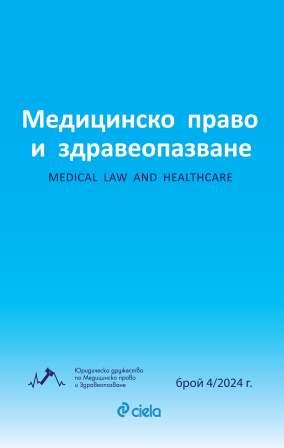
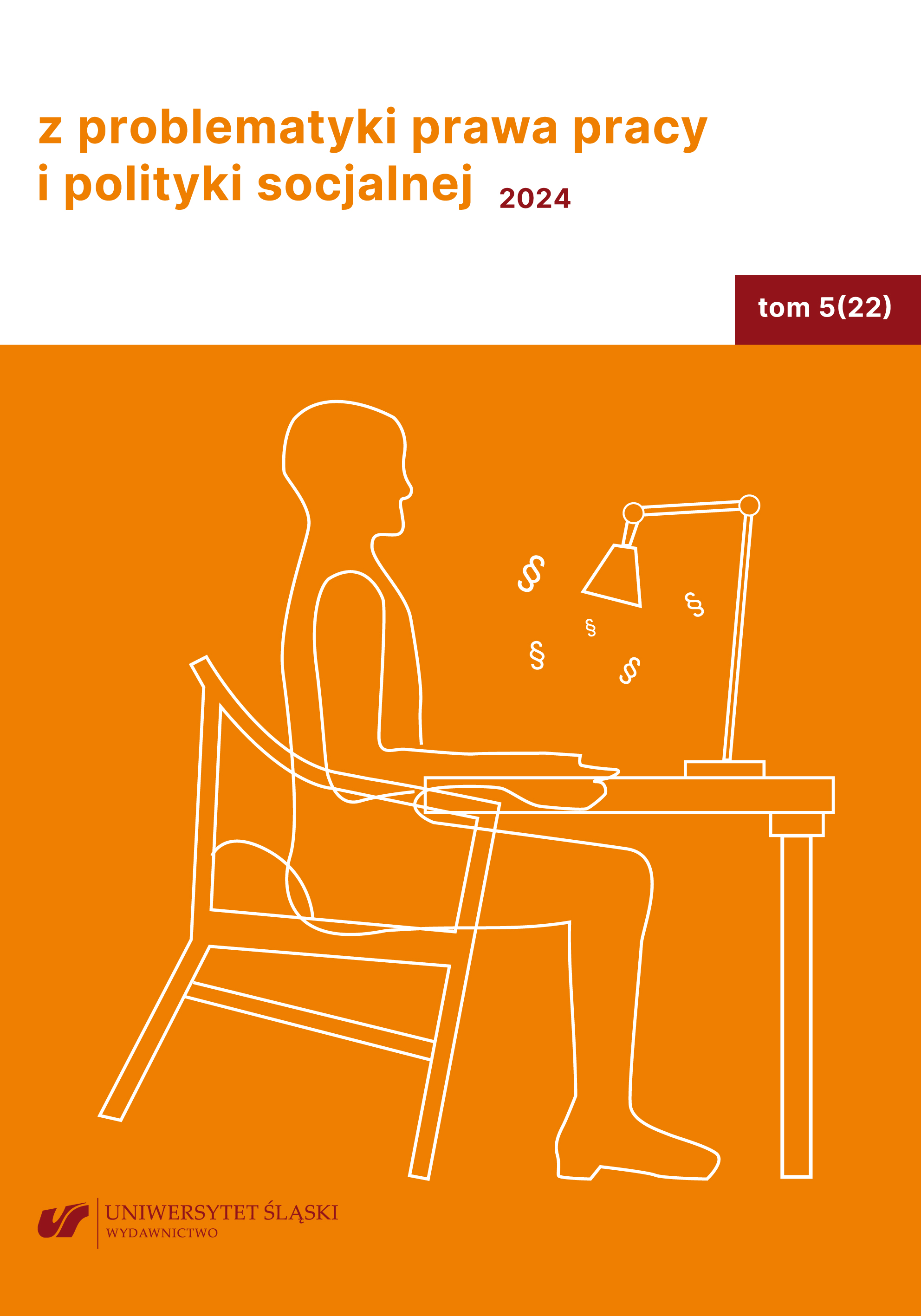
The civil service corps consists of people employed in clerical positions in the government administration offices. Therefore, it is a professional group that remains in a very close relationship with the state, which, pursuant to art. 20 of the constitution should implement, among others, solidarity, dialogue and cooperation of social partners. This article analyses the extent to which this task is carried out in relation to the civil service, that is, at the level where the role of the state is not limited to being a legislator alone, but it also acts as an actual employer.
More...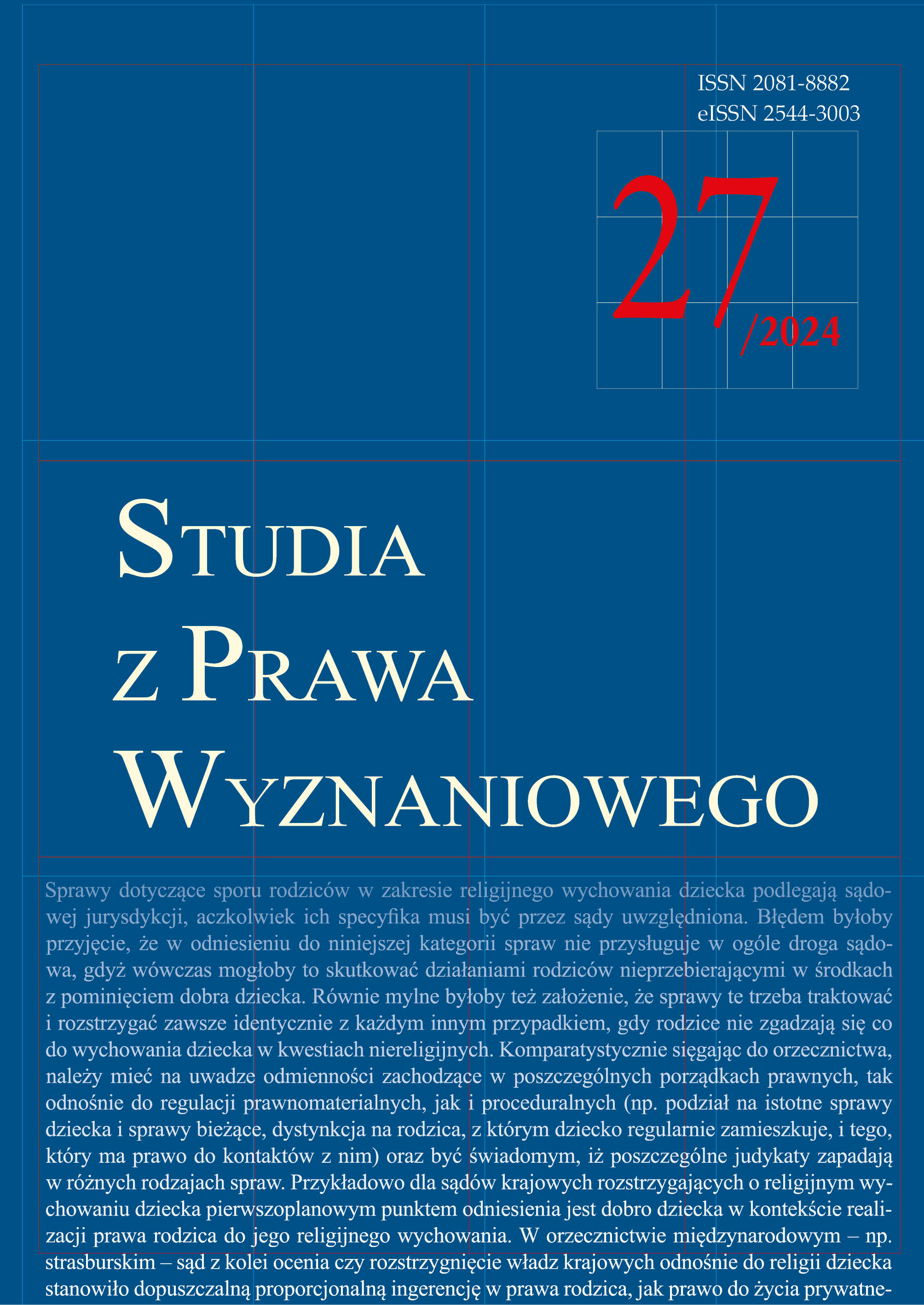
Saving lives is a vital part of a doctor’s work. However, while doctors must adhere to the constitutionally defined principles of health care, they must also acknowledge the principle of patients’ rights, including the patient’s right to self-determination. This means that a doctor cannot define a course of treatment purely according to his or her own understanding as this would limit the patient’s autonomy. Thus, patients today participate in the medical decisions that concern them, and their consent is required for all medical treatments. This may give rise to difficulties in situations that require the simultaneous implementation of two principles: salus aegroti suprema lex est and voluntas aegroti suprema lex est. Patients may refuse treatment for various reasons. In the case of Jehovah’s Witnesses, they may refuse blood transfusions due to their religious beliefs. This paper considers the basis for refusal to consent to treatment and draws on legal solutions in an attempt to address the issue, Polish jurisprudence and opinions expressed by scholars. The author concludes that nobody has the right to demand that a patient explain his or her decision to refuse treatment, even when that stance is irrational from a medical point of view. Instead, the patient’s decision must be freely made and not forced or manipulated. It makes no difference whether this choice relates to a current (specific) situation or to a future scenario (pro futuro statements); however, the decision must relate to the person who makes it—they must be an adult and not incapacitated. The issue of consent must be resolved quite differently when it concerns the treatment of a child, that is, a person who cannot make informed decisions for themselves, but on whose behalf the parents will normally decide. Decisions affecting the life and death of a child exceed the limits of parental authority, and in such circumstances, parental refusal of a child’s treatment should be challenged.
More...
Manipulation, influence operations, and perception management are among the most effective tools in modern international relations, targeting the social, economic, and political structures of nations. This article examines the legal measures adopted by states such as the USA, UK, Russia, Israel, France, Germany, China, Japan, and Italy to combat these threats. It also proposes legal frameworks and strategies to enhance the Republic of Turkey’s ability to counter manipulation and disinformation effectively. Furthermore, it outlines how the Organization of Turkic States can establish a joint combat unit against manipulative efforts targeting its unity and solidarity, detailing its potential structure and operational framework.
More...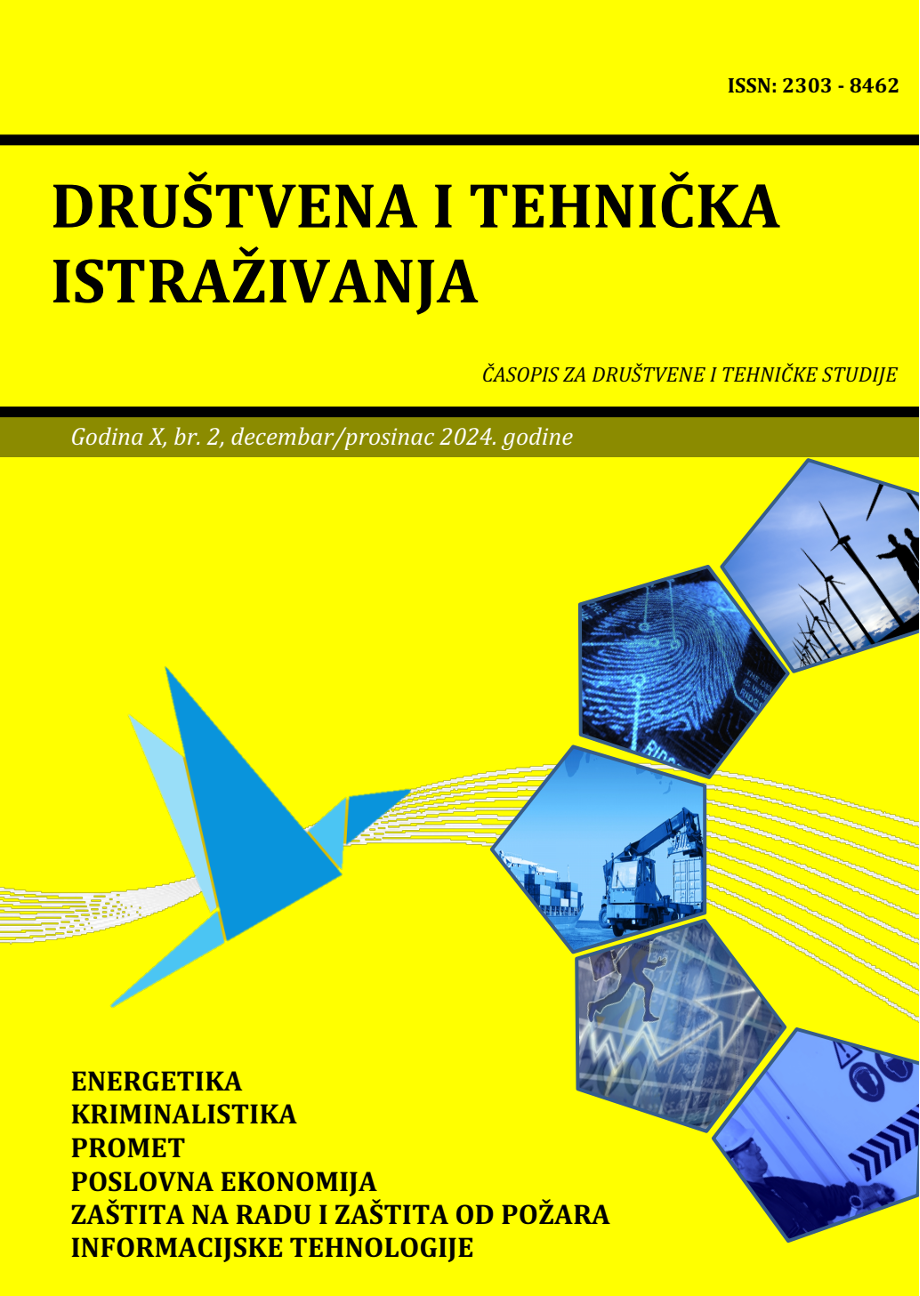
This article examines the development of human resource management (HRM) in public administration, focusing on its organizational role and strategic development. It contrasts traditional HR functions with modern HRM and emphasizes its dynamic nature and strategic importance at higher organizational levels. The analysis highlights the impact of HRM on management tasks, in particular on the lifelong learning and professional development of civil servants. The study emphasizes the need to integrate internal and external strategies in order to increase the efficiency of public administration (PA). It looks at the impact of technological advances and changing working relationships, with skills such as foreign language skills, computer literacy, teamwork and motivation taking precedence over formal qualifications. This transition to a "knowledge society" emphasizes lifelong learning and the adaptation of skills. HRM uses various methods to assess employees' skills and align them with company goals. The article also examines how modern legislation reflects the evolving components of employment and necessitates new legal definitions that align with contemporary HRM trends. Finally, the authors discuss ways to further develop the Croatian HRM model, especially in PA, and propose a timeline for its possible improvement.
More...
This paper addresses the study and analysis of the establishment of the maternity supplement towards the current contributory pension supplement for the reduction of the gender gap from three key points. In the first place, and to understand the establishment of the pension supplement, the basis and legal regime of the so-called maternity supplement is analysed. Secondly, the arguments of the CJEU of 12 December 2019, case C-450/18 are set out, which, as a result of the practical application of the maternity supplement for demographic contribution, declared that there was direct discriminatory treatment on grounds of sex between men and women and that the Spanish legislation was contrary to Council Directive 79/7/EEC, of 19 December 1978 on the progressive implementation of the principle of equal treatment for men and women in matters of social security. Likewise, due to its relevant interest in the matter, the latest CJEU in the matter is addressed, specifically the CJEU of 14 September 2023, case C-311/22. Finally, the legal regime of the new pension supplement for the reduction of the gender gap is briefly described.
More...